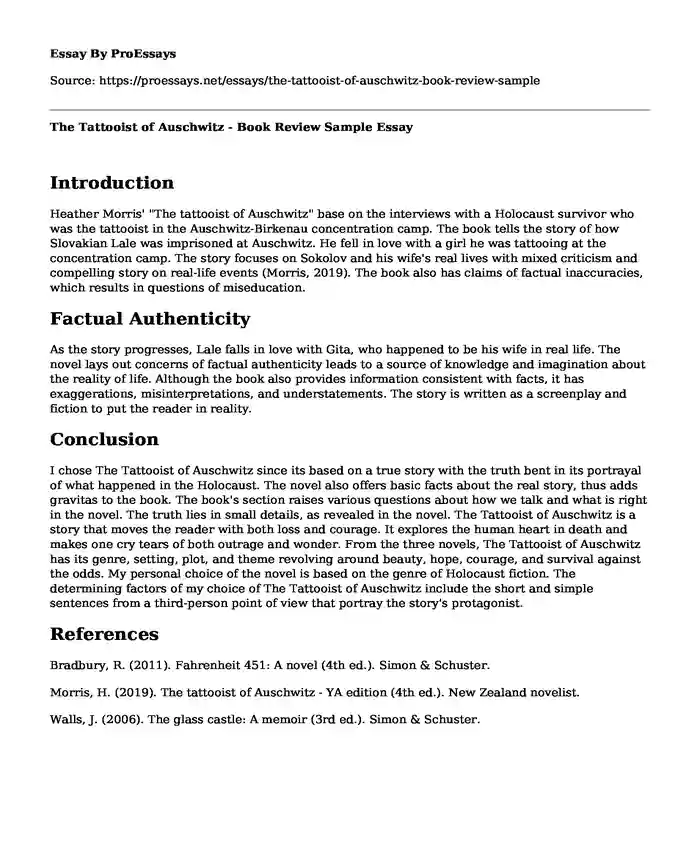Introduction
Heather Morris' "The tattooist of Auschwitz" base on the interviews with a Holocaust survivor who was the tattooist in the Auschwitz-Birkenau concentration camp. The book tells the story of how Slovakian Lale was imprisoned at Auschwitz. He fell in love with a girl he was tattooing at the concentration camp. The story focuses on Sokolov and his wife's real lives with mixed criticism and compelling story on real-life events (Morris, 2019). The book also has claims of factual inaccuracies, which results in questions of miseducation.
Factual Authenticity
As the story progresses, Lale falls in love with Gita, who happened to be his wife in real life. The novel lays out concerns of factual authenticity leads to a source of knowledge and imagination about the reality of life. Although the book also provides information consistent with facts, it has exaggerations, misinterpretations, and understatements. The story is written as a screenplay and fiction to put the reader in reality.
Conclusion
I chose The Tattooist of Auschwitz since its based on a true story with the truth bent in its portrayal of what happened in the Holocaust. The novel also offers basic facts about the real story, thus adds gravitas to the book. The book's section raises various questions about how we talk and what is right in the novel. The truth lies in small details, as revealed in the novel. The Tattooist of Auschwitz is a story that moves the reader with both loss and courage. It explores the human heart in death and makes one cry tears of both outrage and wonder. From the three novels, The Tattooist of Auschwitz has its genre, setting, plot, and theme revolving around beauty, hope, courage, and survival against the odds. My personal choice of the novel is based on the genre of Holocaust fiction. The determining factors of my choice of The Tattooist of Auschwitz include the short and simple sentences from a third-person point of view that portray the story's protagonist.
References
Bradbury, R. (2011). Fahrenheit 451: A novel (4th ed.). Simon & Schuster.
Morris, H. (2019). The tattooist of Auschwitz - YA edition (4th ed.). New Zealand novelist.
Walls, J. (2006). The glass castle: A memoir (3rd ed.). Simon & Schuster.
Cite this page
The Tattooist of Auschwitz - Book Review Sample. (2024, Jan 01). Retrieved from https://proessays.net/essays/the-tattooist-of-auschwitz-book-review-sample
If you are the original author of this essay and no longer wish to have it published on the ProEssays website, please click below to request its removal:
- Was Reconstruction a Success or Failure?
- American History Book Curriculum
- Book Review on All Shook Up by Glenn C. Altschuler Paper Example
- Essay Sample on Bitch & Raven: Two Poems of Contrasting Personas
- Essay Example on Stealing Buddha's Dinner: Bich Nguyen's Memoir of Refugee Life in Grand Rapids
- Essay Sample on British Colonization of the Americas: Challenges and Success
- Bravery and Courage in Neil Gaiman's Coraline - Free Paper Sample







